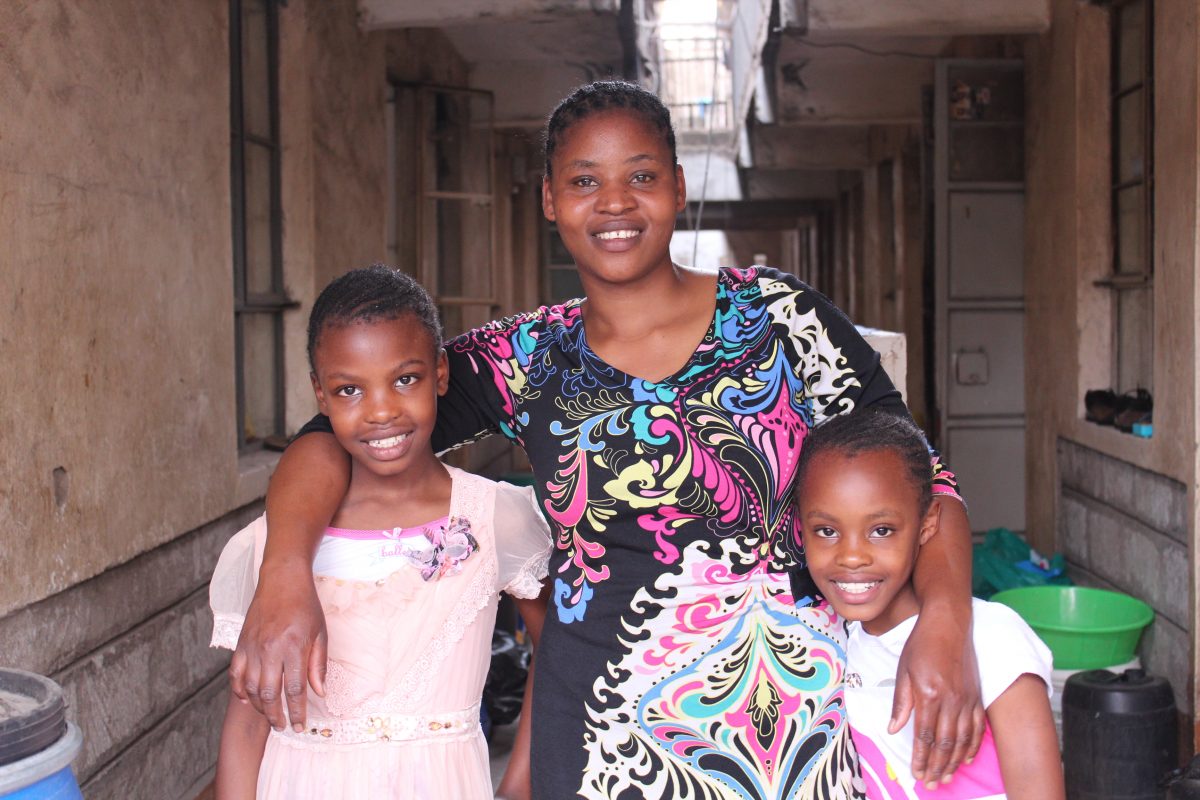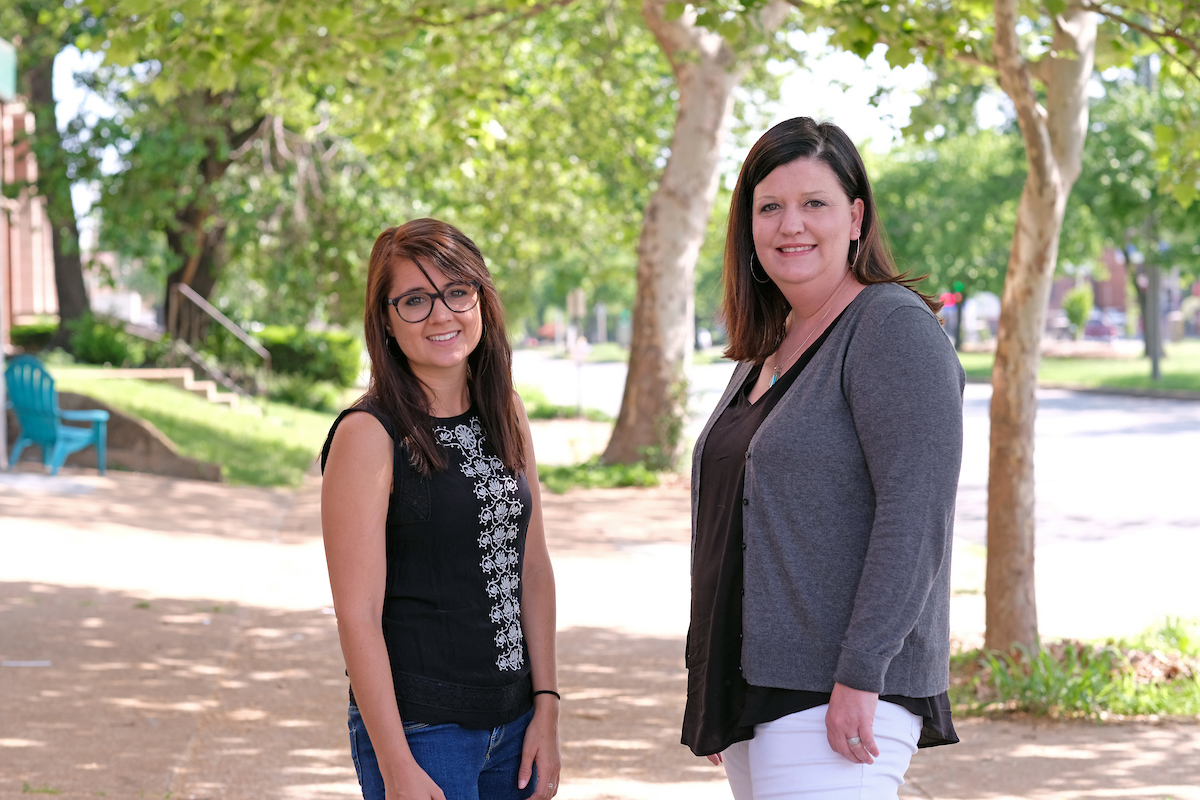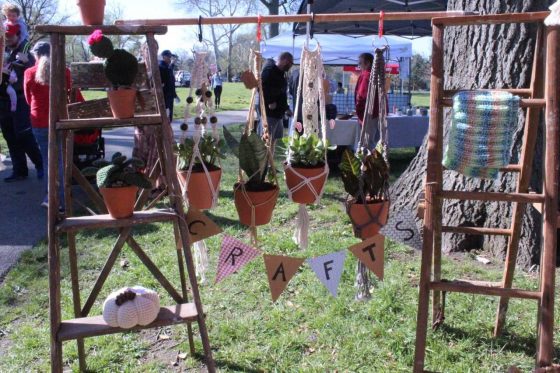
Neema Mungusikiza (center) and her daughters Stella (at left) and Sara have new-found hope and entrepreneurial spirit after becoming program members of Under the Same Tree, a nonprofit managed by UMSL alumnae Kaitlyn Gresham and Christy Horton. Through microfinancing for small business ventures and school tuition sponsorships, UTST economically empowers families living in extreme poverty in Kenya and Uganda. (Photo courtesy of Under the Same Tree)
Before Neema Mungusikiza encountered Under the Same Tree, a nonprofit run by two University of Missouri–St. Louis alumnae, she’d go from house to house in Nairobi, Kenya, offering to wash people’s laundry.
At the end of a good day, she’d have earned $3. The poverty line in Kenya is $1.90.
Mungusikiza, a single mother of two young girls, hadn’t anticipated this life. When she married and left her parents and small village in neighboring Tanzania, she thought her husband would always support the family they had started.
“I put all my dependence on my husband,” she said in a Skype interview. “I never knew that someday he would leave, and I’d have to start supporting myself and my girls.”
She began by selling bananas – walking 15 kilometers to the market every day to buy the fruit and returning to a spot near her home to sell it.
“I didn’t want to give up because I wanted to support my family and kids,” Mungusikiza said.
She had moved to Nairobi for better educational opportunities for her girls, Stella and Sara. But now with a single and extremely limited income, Mungusikiza had to first worry about basic survival for herself and her daughters while living in one of the city’s slums.
Under the Same Tree would help Mungusikiza change the circumstances for herself and her daughters.

Kaitlyn Gresham (at left) and Christy Horton are the driving force behind Under the Same Tree, the 501(c)(3) nonprofit Gresham started in 2012 shortly after graduating from UMSL. She named it after a Rwandan proverb about a village that gathered under the largest, most ancient tree in the area to discuss from where they came, the challenges they’ve faced and how the community will move forward together. (Photo by August Jennewein)
The nonprofit is the brain child of Kaitlyn Gresham, who earned a bachelor’s degree in sociology from UMSL in 2012. UTST works to prevent the cycle of extreme poverty and its effects by economically empowering individuals in the most vulnerable communities in Kenya and Uganda.
After traveling to East Africa as a teen and again as an undergraduate and Pierre Laclede Honors College student, Gresham saw how extreme poverty often led to homelessness, hunger, prostitution, trafficking, child abandonment and illness.
“So many organizations address these things separately,” Gresham said. “But what you don’t often hear is how these issues are interconnected and how one desperate situation will lead to another and another until you’re trapped in this web. The source of all the issues really is lack of income and lack of opportunity.”
After a lot of discussion and planning with local input, Gresham founded UTST in 2012, earning 501(c)(3) status in 2013.
UTST helps individuals within some of the most vulnerable international communities establish a sustainable source of income. Its program members receive business training as well as help creating or building upon small business ventures that UTST finances through small loans from a loan pool it establishes locally.
Individuals receive the added benefit of school tuition sponsorships for their children, so that they don’t have to choose between spending their earnings on food and housing or sending their children to school. This increases the children’s chances at success and better livelihoods.
Program members opt to have the tuition sponsorships serve as collateral, incentivizing their loan repayment. A small interest charge keeps UTST running with the majority of the repayment returning to the loan pool.
At each site, UTST has a local program manager who reports monthly to Gresham via Skype conferences. Many of these connections she established during her earlier travels and maintained online after returning to the states.
In 2017, Gresham enlisted the help of Christy Horton, who earned both bachelor’s and master’s degrees in social work from UMSL, to serve as director of development.
“I was more of a macro-social work student, looking at things more from a systems level and asking why are 30 out of 35 people experiencing this issue instead of focusing on one individual,” Horton said. “The more I learned about how UTST operates, the more I realized this is exactly what I believe in, an organization that promotes dignity and restores hope.”
Together, Gresham and Horton visited program sites in the summer of 2017. They continue to make one to two visits a year. Beyond employing a local program manager, UTST also partners with local organizations in the community.
“I think it’s a real strength of ours to recognize that we don’t know the culture and economy better than the community of people who live it,” Horton said.
In fact, UTST’s connection with its Ugandan partner first originated at UMSL, where Gresham met nursing alumnus Samuel Mugaya, who created Care for Orphans and Community Development – Uganda.
Gresham and the team have watched as UTST has expanded to 21 program members and 46 children over the past few years.

Syrian refugees Hadil Susmieh and Ghaidaa Masrabi sell their macrame, knitted cactus decor and crocheted blankets at the Tower Grove Farmer’s Market in St. Louis, where UTST sponsors a booth for them. (Photo courtesy of Under the Same Tree)
Beyond its international work, UTST has also started a smaller home effort in St. Louis to help refugees who have landed here without support systems.
In keeping with its economic empowerment model, it sponsors farmer’s market booths for the women of the families to sell their arts and crafts. Gresham, Horton and other UTST volunteers hold craft nights on Fridays to assist the women in tagging and pricing their merchandise.
“It gives them the opportunity to generate a little income, but it also gives them the opportunity to gather in a communal way,” Horton said.
“They also develop marketable skills,” Gresham added, “so if they want to put together a resume and seek out more formal employment, they can.”
Back in Kenya, Mungusikiza – who first encountered UTST through a local church – has thrived. She applied to the program with a business proposal to sell porridge to morning commuters.
Building off her profits and loan, she started selling kangas (traditional African wraps worn as clothing). Then, Mungusikiza bought pigs, reared them and sold them. Now she sells shoes she buys in bulk from businesses such as Goodwill that ship their excess, and she makes about $20 overall each day.
“She keeps diversifying her revenue stream,” Gresham said, “maximizing her earning potential by working different businesses at different parts of the day.”
For Mungusikiza, the opportunity has meant a more stable lifestyle – one where she can afford rent and have her daughters receive the education she’s always desired for them.
But the program has done more than meet needs. UTST built upon the already driven nature of Mungusikiza and her personal interest in entrepreneurship. Since building her own success and moving out of the worst of the slums in Nairobi, she’s started helping other women in her community, offering them advice and sometimes starter loans from her own profits.
“In essence, she’s replicating our program on a smaller scale,” said Gresham, who enjoys seeing UTST’s work empower the community.
“I have peace,” Mungusikiza said. “My children are living a life where if they need something, I’m able to provide it for them.”














